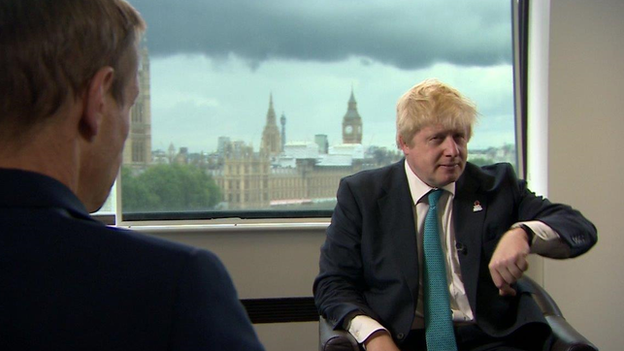Boris Johnson on Brexit, steel and Wales
- Published
- comments

Time for Brexit? Boris Johnson prepars to answer questions about the EU and Wales.
One of the challenges facing the Vote Leave campaign has been to sketch out a picture of what Britain would be like after Brexit.
Who would we trade with? How would Britain get its voice heard in the world? And what would happen to the money that comes the way of farmers and the poorer parts of Wales from Brussels?
The Vote Leave campaign has tried to answer the last of these questions today, with a "commitment" to maintaining funding at current levels until 2020. That means £240 million in direct payments to farmers a year (based on 2014 figures), with £957 million available between 2014 and 2020 in rural development schemes.
Add in the £1.8 billion for the poorer areas between 2014 and 2020 and, as Boris Johnson says, "we're talking billions".
I interviewed Mr Johnson at the Vote Leave offices in London. It was a conversation full of millions and billions, some UK figures and some Welsh ones.
"What we're saying is that the money that's currently spent in Wales, whether it's spent on farming, or supporting culture, or whatever it happens to be, that would continue because any government in its right mind is going to want to subsidise agriculture, and all the other regional funds that continue to be important. It drives a lot of jobs in all sorts of ways, but you get a Brexit dividend in the form of about £10.6 billion [a UK figure] that you could spend on the priorities of this government, the NHS probably being the most attractive."
I suggested that was a promise he couldn't make, as it was a decision for government - and he is not the government.
Boris Johnson: "Absolutely right but what we are saying is that this is what the government could do post-Brexit. This is the Brexit dividend and what they could additionally do is say that the money that is returned to us they could continue to use that to match all the current contributions which are very valued and important for agriculture and so on but then on top of it you'd have a huge wadge of cash back and I think that's very attractive."
'Promises'
Perhaps "what the government could do" is a more accurate reflection of the Vote Leave position than a "commitment". The Britain Stronger In Europe campaign were more dismissive. They issued a statement from the economist Gerald Holtham: "If they were really going to maintain all the EU's regional and farming spending in the UK, they would not be able to fulfil all their promises to spend more money on the NHS, defence and other things."
Mr Johnson also suggested Brexit would be favourable for Tata Steel and Port Talbot as he suggested Britain couldn't cut the cost of energy "because Brussels says 'no' even though the cost of energy is far higher in this country than in most other places in the European Union".
Britain Stronger in Europe say the cost of energy is higher because the UK government "has chosen not to exempt our industries from green levies. Other countries - including Germany - have chosen to do this."
The former mayor of London does have some experience in Wales, from the 1997 general election. "I fought Clwyd South and Clwyd South fought back," as he recalled.
'Squabbles'
In other news, MPs have been debating the Wales Bill for the first time, external. Some of the arguments were familiar. The ever-optimistic Alun Cairns said "clarity and accountability" were at the heart of the Bill which would "end the squabbles over powers between Cardiff Bay and Westminster", external. Remember that one.
His predecessor-but-one, David Jones, again complained that devolving income tax without a referendum was "disrespectful" to the people of Wales.
Cardiff West MP Kevin Brennan did secure some clarity on the proposed powers from Mr Cairns - the Assembly could decide, should it wish, to make voting in its elections compulsory. Such a radical move would more than double the highest turnout in those elections.
And in the House of Lords, Lord Elystan-Morgan praised the behaviour of the 24,000 Welsh supporters in what he called the "Czechoslovakia game".
He told peers: "They reacted to success by way of exquisite choral harmony thus endorsing the views of Dylan Thomas - thank God we are a musical nation."